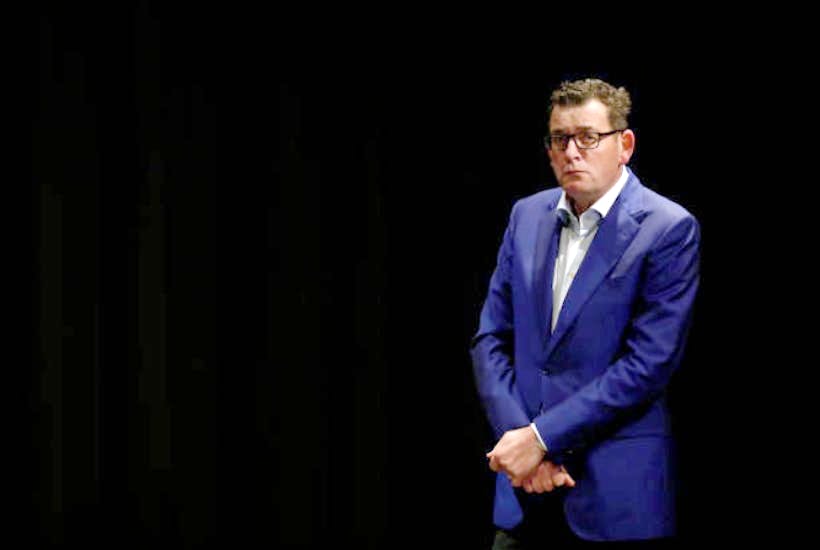Justice Coate’s much-awaited final report of her inquiry into Victoria’s Covid-19 hotel quarantine program is due for release today.
If the interim report is anything to go by, there will merely be findings on the various decisions of the government bureaucracies and recommendations for improving the program in future. Cold comfort indeed for the families of the 800 souls lost to Victoria’s second wave.
Be under no illusion. Today will not be a day of reckoning for the Andrews Government. Don’t expect any blame to be placed squarely at the feet of any single, identifiable Minister; not when you can always blame an intangible, amorphous bureaucracy. Andrews has clearly taken his cue from Sir Humphrey in Yes, Minister: don’t start an inquiry unless you know in advance what its findings will be.
As a result, the serious deficiencies in the state’s pandemic response, which warrant scrutiny, will go unaddressed. Let’s go through these one by one.
1 Our emergency and disaster laws have helped the Andrews Government avoid accountability
First, our emergency and disaster laws confer excessive discretionary power on the government without sufficient parliamentary oversight. This has undermined the separation of powers, the beating heart of our democracy.
For example, the Public Health and Wellbeing Act 2008 allows the Chief Health Officer to issue directions that are ‘reasonably necessary’ to protect public health. These can be altered without any input from Parliament. Some of these, such as rules mandating the use of masks in public, may seem straightforward. What complicates matters is when directions are unclear or inconsistent. For example, it was announced during the Easter period that despite the strict orders to remain at home, individuals travelling to their holiday homes would not be fined. Having one rule for some and another rule for others was patently unacceptable. If Parliament had the opportunity to scrutinise these directions, the rules would have been clearer and better adapted to the health risk.
The state of disaster legislation also leaves much to be desired from an accountability perspective. Under the Emergency Management Act 1986, the Premier can unilaterally declare and extend a state of disaster without parliament’s approval. Subsequently, the Police Minister may direct any government agency ‘to do or refrain from doing any act’ as part of the disaster response. If a statute gets in the way, the Minister may declare it suspended, giving governments the green light to override parliament’s laws and potentially engage in illegal conduct. It is easy to see how this legislation is shockingly open to abuse.
Finally, the Chief Health Officer’s advice that Parliament should not sit during the Stage 4 restrictions gave the distinct impression that the Andrews Government was avoiding scrutiny when it was most warranted. It is decisions such as this which undercut public confidence in the state’s pandemic response.
2 Arbitrary and heavy-handed enforcement of the rules
Given the ambiguity of many directions, Victoria Police was left to interpret them. This led to the arbitrary enforcement of these rules, particularly where fines and arrests were concerned.
Pandemic policing in Victoria, as in NSW, has been condemned as heavy-handed for targeting lower socio-economic groups rather than COVID-19 hotspots. In July, we witnessed the worst excesses of executive overreach in the prolonged, inhumane lockdown of tenants in nine public housing towers. As many warned, high-density towers are essentially ‘vertical cruise ships’ with high rates of viral transmission.
The Chief Health Officer is required by law to review at least every 24 hours whether the continued detention of an individual is necessary. It is questionable this even took place. In any case, less invasive interventions should always be considered before detaining individuals for so long. Little wonder the Victorian Ombudsman recently found that the lockdown violated the human rights of some 3000 tenants and broke the law.
It is also doubtful these same rules were observed in relation to hotel quarantine. If individuals were mandatorily detained in a hotel room for 14 days, this is at odds with the requirement that each detention be reviewed daily. Obviously, there is no longer any need to detain anyone who tests negative for COVID-19, so why did the Government continue to detain them? If anything, doing so unnecessarily exposes that person (and the community) to the virus, given the high-risk environment.
Most outrageous, however, was the Government’s plan to introduce preventative detention powers through its omnibus bill – largely prevented by campaigning in The Spectator Australia’s Flat White pages. If passed, the provisions would have allowed the Government to appoint any person as an ‘authorised officer’, regardless of their qualifications. These officers would have been able to pre-emptively detain others on a subjective belief they will break the rules. This is truly dystopian and pits citizen against citizen. If legal and human rights groups had not stepped in, these draconian provisions would now be law.
3 The ability of the courts and other independent bodies to review government decisions has been strained
Most will be aware that a number of high-profile cases involving the Andrews Government have already been heard by the High Court. However, while judicial review is available, it is mostly a reactive and costly process. Expedited hearings are only available in limited cases. The urgency of responding to a pandemic means coercive powers are exercised on a state-wide scale on a daily basis, affecting tens of millions of people at once. Owing to COVID-19, the courts have also suffered significant delays and a backlog of cases. Where fines and arrests are challenged, an overwhelmed Magistrates’ Court has been unable to schedule hearings for many of these matters before 2022. As such, many will struggle to seek redress under the law.
To make matters worse, budget cuts to the Victorian Ombudsman and IBAC have thwarted these organisations’ efforts to investigate government decisions. The Ombudsman, Deborah Glass, recently claimed the $2 million funding shortfall to her office’s budget ‘risk[ed] looking like attempting to undermine [the Ombudsman].’ As for IBAC, with its recent investigation into controversial developer John Woodman’s donations to Labor dominating the headlines, it’s little wonder cuts have followed.
If the Government is serious about accountability, it should set up a judicial inquiry in a court of law where the ordinary rules of evidence apply. The fact remains that an inquiry without judicial power is simply one without teeth.
The worst Andrews can expect today for the monumental quarantine mess is a slap on the wrist. The many problems with the state’s pandemic response will most certainly go unaddressed. In any case, it will be too close to Christmas — with the memory of the harshness of the winter’s lockdowns too distant — for most people to seriously care.
But we should.
We deserve clarity in our laws and accountability from our lawmakers. It is not possible to force millions of unwilling citizens into submission. Nor can governments fine their way to state-wide compliance with the rules. It only works when people have faith in their institutions. The Government’s end-justifies-the-means approach has seriously undermined this objective. No government must serve as judge, jury and executioner: accountable to no one, least of all the public that put it in power.
Chris Kounelis is a penultimate year Bachelor of Laws (Honours) student at Monash University.
Got something to add? Join the discussion and comment below.
Get 10 issues for just $10
Subscribe to The Spectator Australia today for the next 10 magazine issues, plus full online access, for just $10.

























Comments
Don't miss out
Join the conversation with other Spectator Australia readers. Subscribe to leave a comment.
SUBSCRIBEAlready a subscriber? Log in